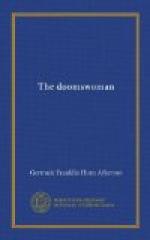“Thou baby, to marry!” she said, softly. “Thou didst take away my breath. Thou dost look no more than fourteen years. I had forgotten the grand merienda of thy eighteenth birthday.”
Prudencia’s little bosom swelled with pride at the discomfiture of the haughty beauty who had rarely remembered to notice her. Prudencia was not poor; she owned a goodly rancho; but it was an hacienda to the state of a Menendez.
“Thou wilt be one of my bridesmaids, no, Dona Valencia?” she asked.
“That will be the proud day of my life,” said Valencia, graciously.
“We have a ball to-night,” said Chonita.
“Thou wouldst have had word to-day. Thou wilt stay now, no? and not ride those five leagues twice again? I will send for thy gown.”
“Truly, I will stay, my Chonita. And thou wilt tell me all about thy visit to Monterey, no?”
“All? Ay! sure!”
Adan kissed both Prudencia’s little hands in earnest congratulation. As he did so, the door of Reinaldo’s room opened, and the heir of the Iturbi y Moncadas stepped forth, gorgeous in black silk embroidered with gold. He had slept off the effects of the night’s debauch, and cold water had restored his freshness. He kissed Prudencia’s hand, his own to us, then bent over Valencia’s with exaggerated homage.
“At thy feet, O loveliest of California’s daughters. In the immensity of thought, going to and coming from Los Angeles, my imagination has spread its wings like an eagle. Thou hast been a beautiful day-dream, posing or reclining, dancing, or swaying with grace superlative on thy restive steed. I have not greeted my good friend Adan. I can but look and look and keep on looking at his incomparable sister, the rose of roses, the queen of queens.”
“Thy tongue carols as easily as a lark’s,” said Valencia, with but half-concealed bitterness. “Thou couldst sing all day,—and the next forget.”
“I forget nothing, beautiful senorita,—neither the fair days of spring nor the ugly storms of winter. And I love the sunshine and flee from the tempest. Adan, brother of my heart, welcome as ever to Casa Grande—Ay! here is my father. He looks like Sancho Panza.”
Don Guillermo’s sturdy little mustang bore him into the court-yard, shaking his stout master not a little. The old gentleman’s black silk handkerchief had fallen to his shoulders: his face was red, but covered with a broad smile.
“I have letters from Monterey,” he said, as Reinaldo and Adan ran down the steps to help him alight. “Alvarado goes by sea to Los Angeles this month, but returns by land in the next, and will honor us with a visit of a week. I shall write to him to arrive in time for the wedding. Several members of the Junta come with him,—and of their number is Diego Estenega.”
“Who?” cried Reinaldo. “An Estenega? Thou wilt not ask him to cross the threshold of Casa Grande?”
“I always liked Diego,” said the old man, somewhat confusedly. “And he is the friend of Alvarado. How can I avoid to ask him, when he is of the party?”




